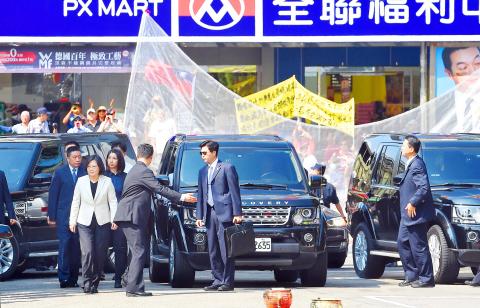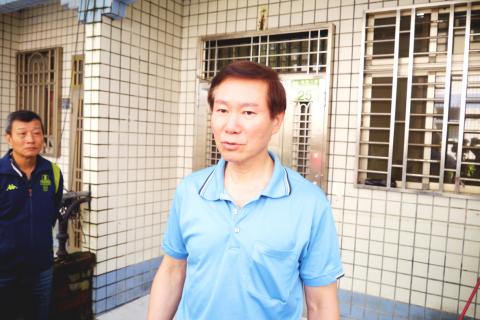High supporter numbers, leaks in the police department and assistance from former police officers are enabling protesters to run effective “guerrilla” campaigns, despite increased security around President Tsai Ing-wen (蔡英文), pension reform opponents said yesterday, adding that “mobile human wall” tactics to keep them away from Tsai’s motorcade would not work.
Protesters have promised to “shadow” Tsai following the passage of pension reforms last month and have had some success in breaking through an increased police presence around the president, including briefly halting her motorcade outside National Defense University in Taipei’s Beitou District (北投) on Thursday last week.
“There are only two roads in and out of the university, so where could she go? The police cannot change the roads,” said Keng Chi-wen (耿繼文), a former director of the National Police Agency’s Internal Affairs Office, who has been one of the most prominent former police officers participating in protests.

Photo: Liu Hsin-de, Taipei Times
Protesters stood along both sides of Zhongyang N Road, moving in front of Tsai’s motorcade as it approached the university entrance before being pushed aside by police.
An increased police presence and barricades around Tsai to keep protesters from getting too close when she arrives at a destination means that “guerrilla” tactics have been used to get close to her, with former police officers who are familiar with presidential security helping show protesters how to congregate and scatter along potential motorcade routes, Keng said.
“We are experts, so it is easy for us to predict the president’s route and backup route,” he said, adding that protesters also often receive leaked information from police.

Photo: Wang Chun-chi, Taipei Times
“We can make quick observations and then divide our forces along potential routes, so there is a chance of blocking her regardless of which way they drive,” he said.
“It might be different if Tsai was just a movie star who could come and go quietly, but presidential security leaves an extremely obvious footprint,” Taiwan Policemen Association executive director Chen Chih-chieh (陳志傑) said, adding that protesters relay signs of police reconnaissance and barricading via social media to predict the president’s movements and mobilize quickly.
“There are different standard operating procedures for the president compared with the vice president or a minister, so we can predict who is coming based on police preparations,” Chen said.
Reports that police plan to begin deploying a “mobile human wall” to counter protesters’ tactics drew disparaging remarks.
“Even if they block off one point, we will just catch Tsai later on,” Keng said.
“Even if the wall succeeds, the sight of policemen being forced to run around would still be embarrassing to Tsai, which is our objective,” Chen said.
It is possible Tsai might be faced with a car suddenly “breaking down” in front of her motorcade, Yunlin County Retired Police Officers Association executive director Lai Kun-yu (賴坤柚) said.

CHAOS: Iranians took to the streets playing celebratory music after reports of Khamenei’s death on Saturday, while mourners also gathered in Tehran yesterday Iranian Supreme Leader Ayatollah Ali Khamenei was killed in a major attack on Iran launched by Israel and the US, throwing the future of the Islamic republic into doubt and raising the risk of regional instability. Iranian state television and the state-run IRNA news agency announced the 86-year-old’s death early yesterday. US President Donald Trump said it gave Iranians their “greatest chance” to “take back” their country. The announcements came after a joint US and Israeli aerial bombardment that targeted Iranian military and governmental sites. Trump said the “heavy and pinpoint bombing” would continue through the week or as long

TRUST: The KMT said it respected the US’ timing and considerations, and hoped it would continue to honor its commitments to helping Taiwan bolster its defenses and deterrence US President Donald Trump is delaying a multibillion-dollar arms sale to Taiwan to ensure his visit to Beijing is successful, a New York Times report said. The weapons sales package has stalled in the US Department of State, the report said, citing US officials it did not identify. The White House has told agencies not to push forward ahead of Trump’s meeting with Chinese President Xi Jinping (習近平), it said. The two last month held a phone call to discuss trade and geopolitical flashpoints ahead of the summit. Xi raised the Taiwan issue and urged the US to handle arms sales to

State-run CPC Corp, Taiwan (CPC, 台灣中油) yesterday said that it had confirmed on Saturday night with its liquefied natural gas (LNG) and crude oil suppliers that shipments are proceeding as scheduled and that domestic supplies remain unaffected. The CPC yesterday announced the gasoline and diesel prices will rise by NT$0.2 and NT$0.4 per liter, respectively, starting Monday, citing Middle East tensions and blizzards in the eastern United States. CPC also iterated it has been reducing the proportion of crude oil imports from the Middle East and diversifying its supply sources in the past few years in response to geopolitical risks, expanding

Pro-democracy media tycoon Jimmy Lai’s (黎智英) fraud conviction and prison sentence were yesterday overturned by a Hong Kong court, in a surprise legal decision that comes soon after Lai was jailed for 20 years on a separate national security charge. Judges Jeremy Poon (潘兆初), Anthea Pang (彭寶琴) and Derek Pang (彭偉昌) said in the judgement that they allowed the appeal from Lai, and another defendant in the case, to proceed, as a lower court judge had “erred.” “The Court of Appeal gave them leave to appeal against their conviction, allowed their appeals, quashed the convictions and set aside the sentences,” the judges